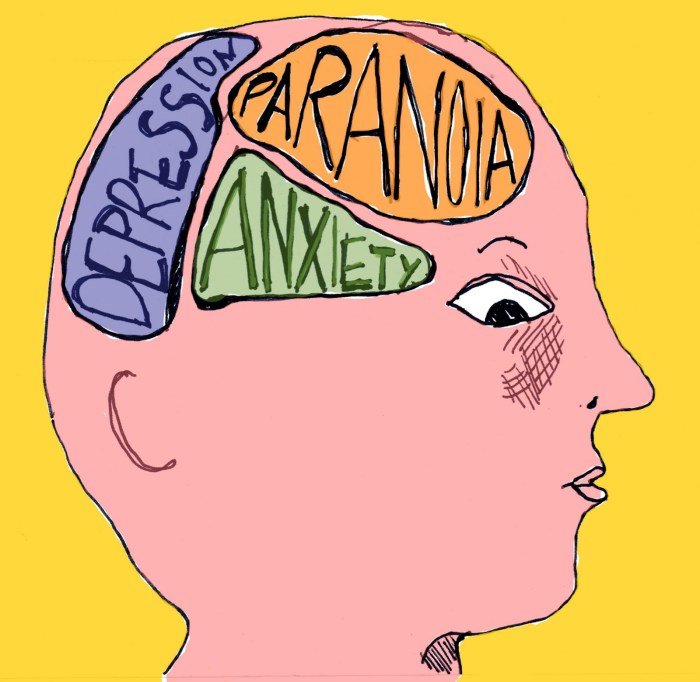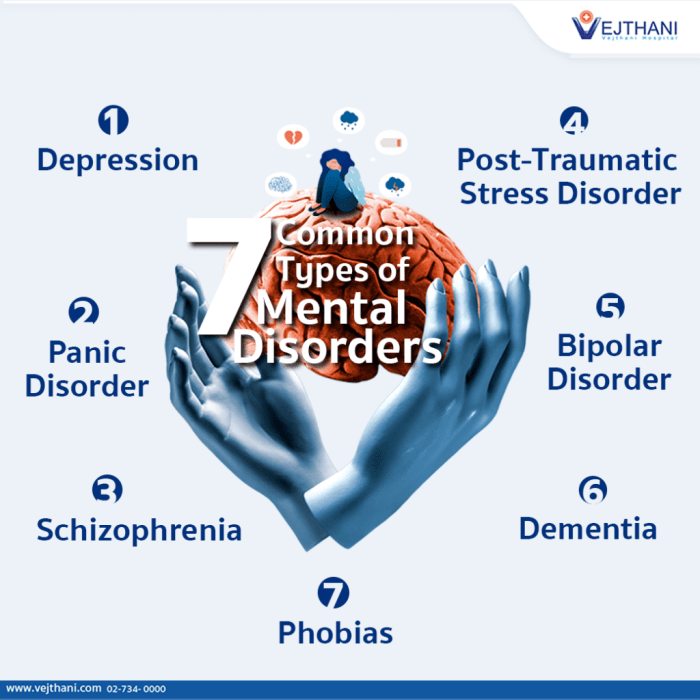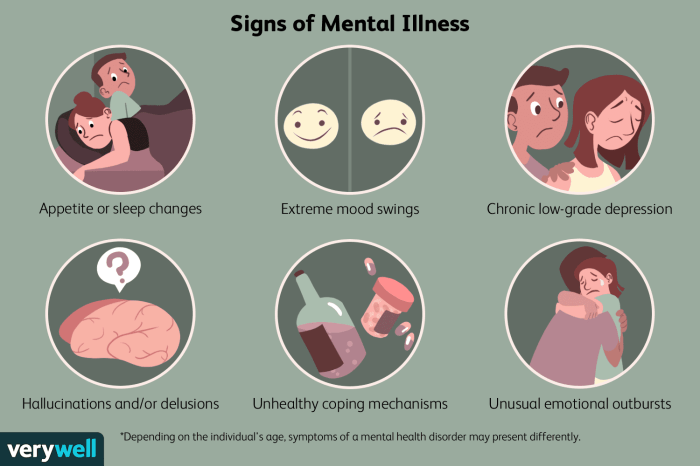Can you be an EMT with mental illness? This question raises complex ethical, legal, and practical considerations. This article delves into the impact of mental illness on EMT performance, exploring the potential risks and benefits of employing individuals with mental health conditions in emergency medical services.
We will examine the physical, mental, and emotional demands of being an EMT and discuss the educational and training requirements for this critical role. We will also explore the ethical implications of hiring EMTs with mental illness, considering the potential impact on patient safety and the rights of individuals with mental health conditions.
Definition of Mental Illness

Mental illness, also known as mental health disorder, refers to a wide range of conditions that affect a person’s thinking, feeling, behavior, and overall well-being. These conditions can vary in severity, from mild to severe, and can impact an individual’s daily life in various ways.
Mental illnesses can be caused by a combination of genetic, biological, environmental, and psychological factors. They can manifest in different forms, each with its unique set of symptoms and characteristics.
Types of Mental Illnesses
There are numerous types of mental illnesses, each with its own specific symptoms and diagnostic criteria. Some of the most common types include:
- Anxiety disorders: Characterized by excessive fear, worry, and anxiety that can interfere with daily life.
- Mood disorders: Involve significant changes in mood, such as depression, bipolar disorder, and cyclothymia.
- Psychotic disorders: Characterized by a loss of contact with reality, such as schizophrenia and schizoaffective disorder.
- Personality disorders: Involve inflexible and unhealthy personality traits that cause significant distress or impairment.
- Eating disorders: Characterized by disturbances in eating behavior, such as anorexia nervosa, bulimia nervosa, and binge-eating disorder.
- Substance use disorders: Involve the excessive use of drugs or alcohol, leading to dependence and impairment.
Impact of Mental Illness
Mental illnesses can have a profound impact on an individual’s daily life. They can affect their ability to work, study, maintain relationships, and participate in social activities. Additionally, mental illnesses can lead to physical health problems, such as heart disease, diabetes, and obesity.
The stigma associated with mental illness can also be a significant barrier to recovery. People with mental illness may face discrimination, prejudice, and social isolation, which can further exacerbate their symptoms.
EMT Job Requirements: Can You Be An Emt With Mental Illness

EMT (Emergency Medical Technician) is a healthcare professional who provides emergency medical care to patients in a variety of settings, including ambulances, fire stations, and hospitals. The job of an EMT requires a combination of physical, mental, and emotional demands, as well as specific educational and training requirements.The
physical demands of being an EMT include the ability to lift and move patients, as well as to work in a variety of weather conditions. EMTs must also be able to stand for long periods of time and to perform strenuous activities, such as CPR and other emergency procedures.The
mental demands of being an EMT include the ability to make quick decisions in stressful situations, to remain calm under pressure, and to deal with the emotional challenges of working with patients who are injured or ill. EMTs must also be able to work as part of a team and to communicate effectively with other healthcare professionals.The
emotional demands of being an EMT include the ability to deal with the stress of working in a high-pressure environment, to see patients who are suffering, and to deal with the emotional toll of working with patients who have died.
EMTs must also be able to maintain a positive attitude and to provide support to patients and their families.The educational and training requirements for EMTs vary depending on the state or country in which they work. In general, EMTs must complete a training program that includes both classroom instruction and hands-on experience.
EMTs must also pass a national certification exam in order to practice.
Physical Demands
The physical demands of being an EMT can be significant. EMTs must be able to lift and move patients, as well as to work in a variety of weather conditions. EMTs must also be able to stand for long periods of time and to perform strenuous activities, such as CPR and other emergency procedures.Some
of the specific physical demands of being an EMT include:* Lifting and moving patients
- Working in a variety of weather conditions
- Standing for long periods of time
- Performing strenuous activities, such as CPR and other emergency procedures
Mental Demands
The mental demands of being an EMT can also be significant. EMTs must be able to make quick decisions in stressful situations, to remain calm under pressure, and to deal with the emotional challenges of working with patients who are injured or ill.
EMTs must also be able to work as part of a team and to communicate effectively with other healthcare professionals.Some of the specific mental demands of being an EMT include:* Making quick decisions in stressful situations
- Remaining calm under pressure
- Dealing with the emotional challenges of working with patients who are injured or ill
- Working as part of a team
- Communicating effectively with other healthcare professionals
Emotional Demands
The emotional demands of being an EMT can be significant. EMTs must be able to deal with the stress of working in a high-pressure environment, to see patients who are suffering, and to deal with the emotional toll of working with patients who have died.
EMTs must also be able to maintain a positive attitude and to provide support to patients and their families.Some of the specific emotional demands of being an EMT include:* Dealing with the stress of working in a high-pressure environment
- Seeing patients who are suffering
- Dealing with the emotional toll of working with patients who have died
- Maintaining a positive attitude
- Providing support to patients and their families
Educational and Training Requirements
The educational and training requirements for EMTs vary depending on the state or country in which they work. In general, EMTs must complete a training program that includes both classroom instruction and hands-on experience. EMTs must also pass a national certification exam in order to practice.The
specific educational and training requirements for EMTs may include:* Classroom instruction in anatomy, physiology, medical terminology, and emergency medical procedures
- Hands-on experience in a clinical setting
- Passing a national certification exam
Impact of Mental Illness on EMT Performance

The employment of EMTs with mental illness poses potential risks and benefits that require careful consideration. While some individuals with mental illness may be fully capable of performing their duties effectively, others may experience challenges that impact their ability to provide safe and efficient emergency medical care.
Potential Risks
- Impaired Judgment:Mental illness can affect an EMT’s ability to make sound decisions in critical situations, leading to errors in patient care or safety risks.
- Reduced Concentration and Memory:Certain mental health conditions can impair concentration and memory, making it difficult for EMTs to recall important information or follow instructions accurately.
- Increased Stress and Anxiety:EMTs with mental illness may experience heightened stress and anxiety levels, which can interfere with their ability to remain calm and focused during emergencies.
- Substance Abuse:Individuals with mental illness are more likely to engage in substance abuse, which can further impair their judgment and performance.
Potential Benefits
- Empathy and Compassion:Individuals with mental illness may possess enhanced empathy and compassion, allowing them to connect with patients on a deeper level.
- Resilience:EMTs with mental illness may have developed coping mechanisms and resilience that enable them to handle the challenges of the job effectively.
- Diversity:Hiring EMTs with mental illness promotes diversity and inclusion in the workplace, fostering a more supportive and understanding environment.
Ethical Considerations
Hiring EMTs with mental illness poses complex ethical considerations. The primary concern is the potential impact on patient safety and the rights of individuals with mental illness.
Impact on Patient Safety
- EMT’s mental illness may impair their ability to perform critical tasks, such as making accurate assessments, administering medications, and managing emergencies.
- Cognitive impairments, emotional instability, or hallucinations can compromise their decision-making and put patients at risk.
Rights of Individuals with Mental Illness
- Individuals with mental illness have the right to work and contribute to society, including serving as EMTs.
- Discriminating against applicants based on mental health history raises concerns about violating anti-discrimination laws and stigmatizing mental illness.
Balancing these concerns requires a thoughtful and nuanced approach. It is essential to consider the severity and stability of the individual’s mental illness, as well as their ability to perform the job safely and effectively.
Legal Considerations
In the realm of emergency medical services, legal regulations and guidelines provide a framework for the employment of individuals with mental illness as Emergency Medical Technicians (EMTs).
The Americans with Disabilities Act (ADA) of 1990 prohibits discrimination against individuals with disabilities, including mental illness, in employment. Employers are required to make reasonable accommodations for employees with disabilities, unless doing so would create an undue hardship for the employer.
Legal Risks and Liabilities, Can you be an emt with mental illness
Hiring EMTs with mental illness may pose potential legal risks and liabilities for employers. These include:
- Negligence:Employers could be held liable for negligence if they fail to take reasonable steps to prevent harm caused by an EMT with mental illness.
- Discrimination:Employers could be held liable for discrimination if they refuse to hire or terminate an EMT based on their mental illness, without a legitimate job-related reason.
- Vicarious Liability:Employers could be held vicariously liable for the actions of an EMT with mental illness if those actions occur within the scope of their employment.
Accommodations and Support

EMT professionals with mental illness require specialized accommodations and support to manage their condition effectively and maintain job performance. These accommodations and support systems aim to create an inclusive and supportive work environment that promotes well-being and productivity.
Various accommodations can be implemented to address the specific needs of EMTs with mental illness. These may include:
Flexible Work Arrangements
- Modified work schedules that accommodate appointments for therapy or medication management.
- Job sharing or reduced work hours to manage stress and prevent burnout.
- Designated quiet spaces or breaks to manage anxiety or overwhelming emotions.
Training and Education
- Mental health training for colleagues to foster understanding and reduce stigma.
- Peer support groups or mentorship programs to provide emotional support and guidance.
- Access to confidential mental health resources, such as employee assistance programs or counseling services.
Workplace Modifications
- Assistive technology or software to support cognitive or emotional functioning.
- Sensory-friendly workspaces to minimize distractions or triggers.
- Reduced workload or task modifications to manage stress and prevent exacerbations.
Resources and Training

EMT professionals facing mental health concerns have a variety of resources and training programs at their disposal to support their well-being and enhance their performance on the job.
These resources and training programs are designed to provide EMTs with the knowledge, skills, and support they need to manage their mental health effectively while maintaining their professional responsibilities.
Support Groups
- Support groups offer a safe and confidential space for EMTs to connect with peers who understand their unique challenges and experiences.
- These groups provide a platform for sharing experiences, coping strategies, and emotional support.
Mental Health Training Programs
- Training programs specifically designed for EMTs with mental illness can provide valuable insights into the impact of mental health on job performance.
- These programs teach EMTs self-management techniques, coping mechanisms, and strategies for maintaining their mental well-being while on the job.
Employee Assistance Programs (EAPs)
- Many employers offer EAPs that provide confidential counseling and support services to employees, including EMTs.
- EAPs can connect EMTs with licensed mental health professionals who can provide individual or group therapy, crisis intervention, and other support services.
Online Resources
- Various online resources are available to provide information, support, and guidance to EMTs with mental illness.
- These resources include websites, forums, and online communities where EMTs can connect with others, share experiences, and access mental health information.
Question Bank
Can EMTs with mental illness perform their duties effectively?
The impact of mental illness on EMT performance varies depending on the individual and the nature of their condition. With appropriate support and accommodations, EMTs with mental illness can perform their duties effectively and safely.
What are the ethical considerations involved in hiring EMTs with mental illness?
Ethical considerations include ensuring patient safety, respecting the rights of individuals with mental illness, and promoting an inclusive work environment. Employers must balance these considerations carefully.
What legal regulations govern the employment of EMTs with mental illness?
Legal regulations vary by jurisdiction but generally prohibit discrimination based on mental health status. Employers must comply with these regulations and ensure that employment decisions are based on job-related criteria.